10+ Proven and Effective B2B SaaS Lead Generation Strategies in 2024
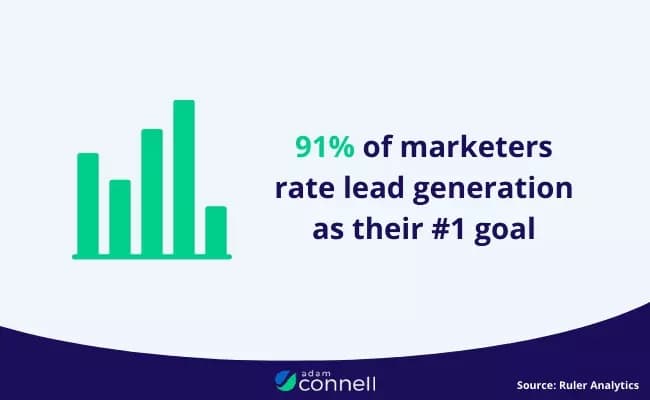
In this article, I’ll walk you through 10+ proven strategies for B2B SaaS lead generation that are effective, actionable, and results-driven.
We’ll learn:
- Importance of lead generation for SaaS businesses
- Difference between B2C and B2B SaaS Leads
- Best outbound SaaS lead generation strategies
- Best inbound SaaS lead generation strategies
But before jumping into strategies, let’s help newbies understand what exactly is lead generation and how important it is for SaaS companies.
What is Lead Generation?
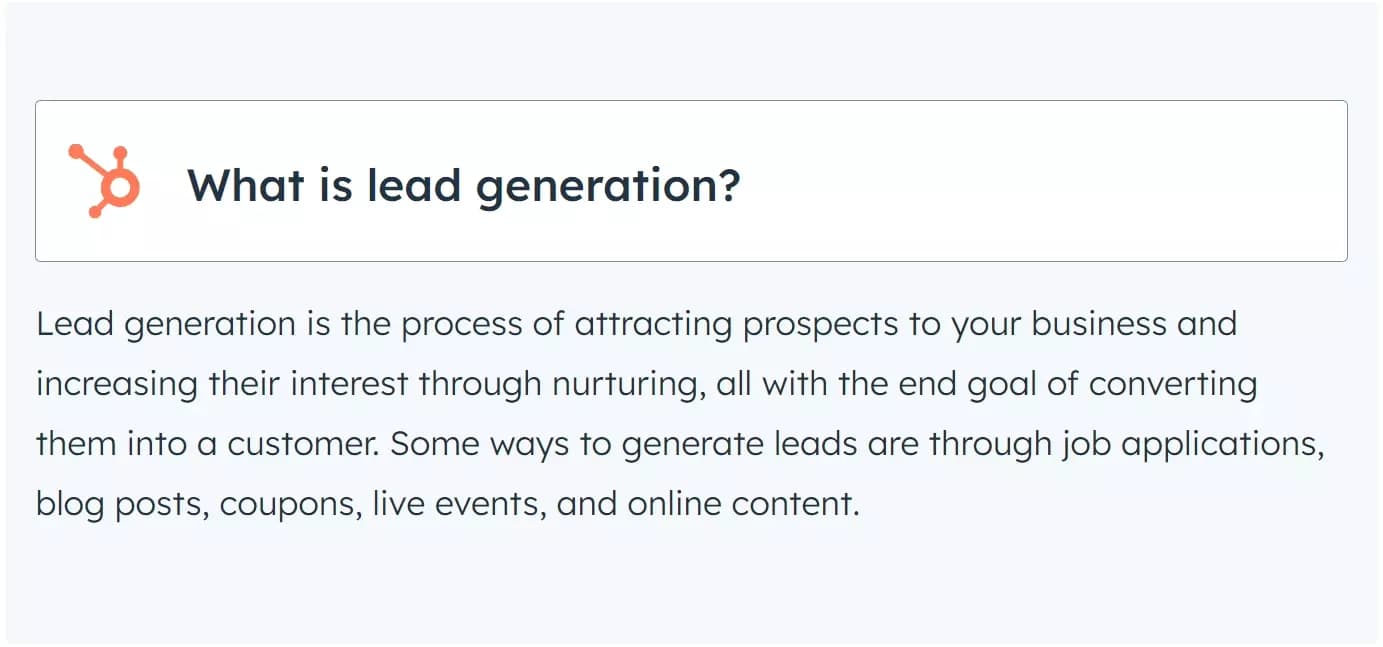
So many difficult words for a newbie (and non-native English speakers like me). Let me simplify it.
Lead Generation is the process of finding and attracting people who might be interested in your product or service.
Imagine you have a cool new app. Lead generation would be all the things you do to get people to notice your app and think, "Hey, that looks useful!".
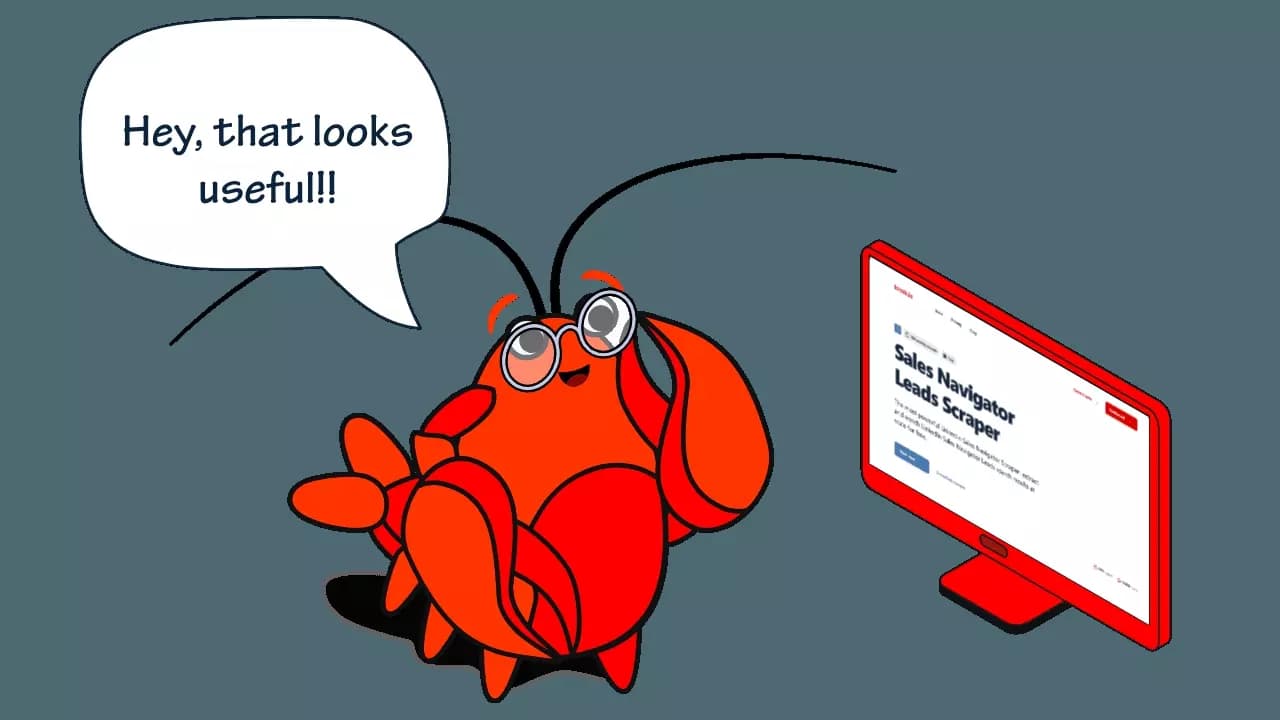
The goal is to turn these interested people into leads.
But what is a lead?
What is a lead?
A lead is someone who has shown some interest in what you are offering, and you want to nurture that interest to turn them into a paying customer.
Imagine you're baking a cake. A lead is like someone who might be interested in buying your cake.
Types of lead
Leads can be categorized in various ways, but there are two most common methods.
- By warmth
- By qualification
By warmth
| Type | Definition | Example | Approach |
|---|---|---|---|
| Cold | Individuals or businesses who have had no prior interaction with your brand and have shown no interest in your product or service | A list of email addresses acquired from a 3rd party | Requires awareness-building activities like introductory emails, cold calls, or ads to generate interest |
| Warm | Prospects who have shown some interest in your brand but haven’t made a purchase yet | Someone who has visited your website, signed up for a newsletter, or downloaded a free eBook | Needs nurturing through follow-up emails, personalized content, or demos to move them closer to a purchase |
| Hot | Prospects who are highly interested and ready to make a purchase soon | Someone who has requested a pricing quote or a product demo | Requires prompt and personalized follow-up to convert into a sale, often through direct contact or a sales call |
By qualification
| Type | Definition | Example | Approach |
|---|---|---|---|
| Marketing Qualified Leads (MQLs) | Leads who have engaged with your marketing efforts and are more likely to become customers based on predefined criteria | Someone who regularly interacts with your emails, attends webinars, or downloads multiple pieces of content | These leads need further nurturing with targeted content and engagement strategies to prepare them for a sales conversation |
| Sales Qualified Leads (SQLs) | Leads who have been vetted by the sales team and deemed ready for direct sales engagement | Someone who has had a conversation with a sales rep and expressed a clear interest in purchasing | Requires immediate and focused attention from the sales team to close the deal, often involving customized proposals or negotiations |
| Product Qualified Leads (PQLs) | Leads who have experienced your product through a trial or freemium model and have shown interest in becoming paying customers | Users of a free trial version who frequently use the product or explore premium features | Requires efforts to demonstrate the value of the paid version and encourage conversion, often through personalized outreach or limited-time offers |
| Service Qualified Leads | Existing customers who have indicated an interest in an upgrade or additional services | A customer using a basic version of your software who asks about premium features or services | Focus on upselling or cross-selling opportunities by highlighting the benefits and value of the additional services |
But does it matter for SaaS companies?
Importance of lead generation for SaaS businesses
Lead generation is more than just finding potential customers. Effective lead generation is the lifeblood of SaaS businesses.
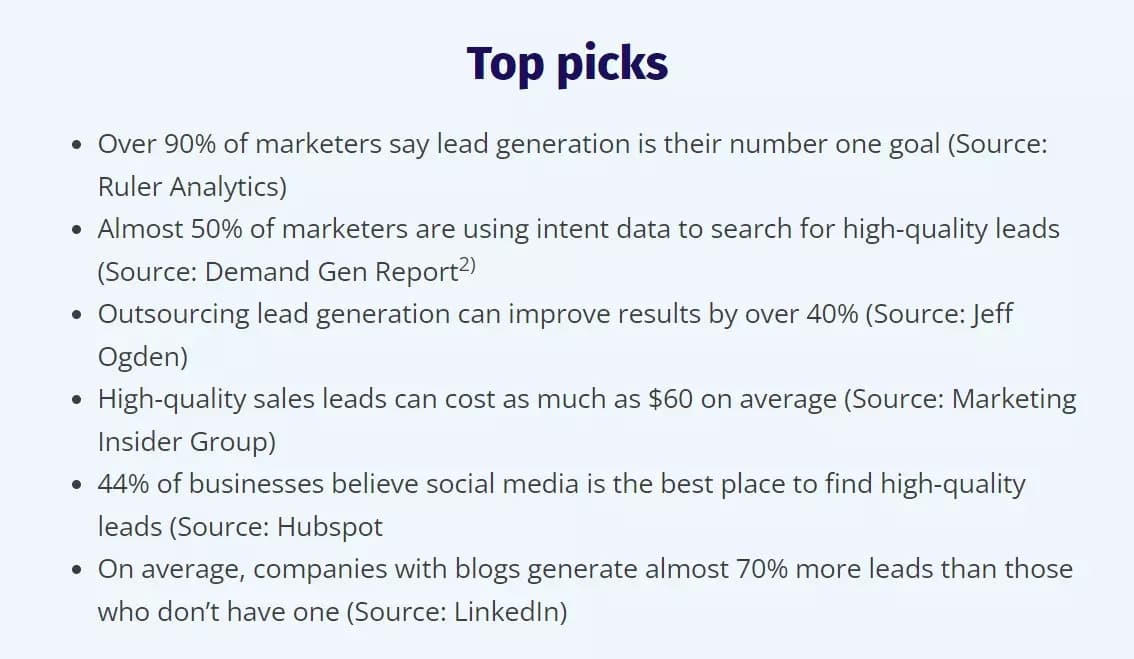
It is important in driving growth, revenue, and market penetration.
- Boost sales and revenue
- Grow your customer base
- Understand your customers
- Gain a competitive edge
- Improve sales efficiency
- Reduce business risk
- Build a stronger brand
Leads can be Business-to-Business (B2B) or Business-to-Consumer (B2C) depending on your SaaS business model.
What is the difference between them?
Difference between B2C and B2B SaaS Leads
Let’s understand major differences between B2C and B2B SaaS leads through a comparison table.
| Aspect | B2C SaaS Leads | B2B SaaS Leads |
|---|---|---|
| Target Audience | Individual consumers with diverse needs and interests | Individual companies with diverse needs and interests |
| Decision-Making Process | Quicker, often based on emotions and individual needs | Slower, often involving multiple stakeholders and a thorough evaluation of the product's impact on business operations |
| Lead Qualification | Demographics (age, location, income), interests, online behavior | Company size, industry, budget, pain points, decision-making structure |
| Sales Cycle | Shorter (minutes to days), often self-serve signup with freemium models | Longer (weeks to months), may involve demos, negotiations, proposals, and contracts |
| Lead Nurturing | Personalized recommendations, special offers, gamification elements | Targeted content addressing specific business challenges, email drip campaigns with educational resources, personalized communication with decision-makers |
| Metrics Tracked | Cost per acquisition (CPA), conversion rate, social media engagement, user lifetime value (LTV) | Lead generation cost per lead (CPL), marketing qualified lead (MQL) conversion rate, sales qualified lead (SQL) conversion rate, customer lifetime value (LTV) |
But how do I find quality leads for my SaaS business?
Well in this article, I’m only focusing on B2B SaaS leads generation. I’m going to share the best lead generation strategies for B2B SaaS businesses.
10+ Effective and Proven B2B SaaS Lead Generation Strategies
I’m going to categorize all strategies into two main categories.
- Outbound lead generation
- Inbound lead generation
Outbound lead generation is a proactive approach to attracting potential customers.
It involves directly reaching out to individuals or businesses who may not be aware of your brand or haven't actively expressed interest in your products or services.
Inbound lead generation focuses on attracting potential customers who are already searching for solutions by creating high-quality content that educates and informs them.
But what are the key differences between inbound and outbound lead generation?
Key differences between inbound and outbound lead generation
| Aspect | Outbound Lead Generation | Inbound Lead Generation |
|---|---|---|
| Approach | Direct outreach through various channels | Creating valuable content to draw in prospects |
| Audience | Broad, often less targeted | More targeted, based on audience interests and behaviors |
| Interaction Initiation | Initiated by the business | Initiated by the prospect |
| Sales Cycle | Often shorter, but can be seen as intrusive | Generally longer, building trust over time |
| Cost | Can be more expensive due to ads and outreach efforts | Can be more cost-effective but requires time and content creation resources |
| Scalability | Can be scaled quickly with resources | Takes time to build but scales sustainably |
| Lead Quality | Varies, can include uninterested or unqualified leads | Often higher quality as leads are self-selected |
| Effectiveness | Immediate results but can be disruptive | Long-term growth with steady, organic traffic |
Let’s understand the difference between inbound and outbound lead generation through an example.
Imagine you want to start a small lemonade business and need to attract customers.
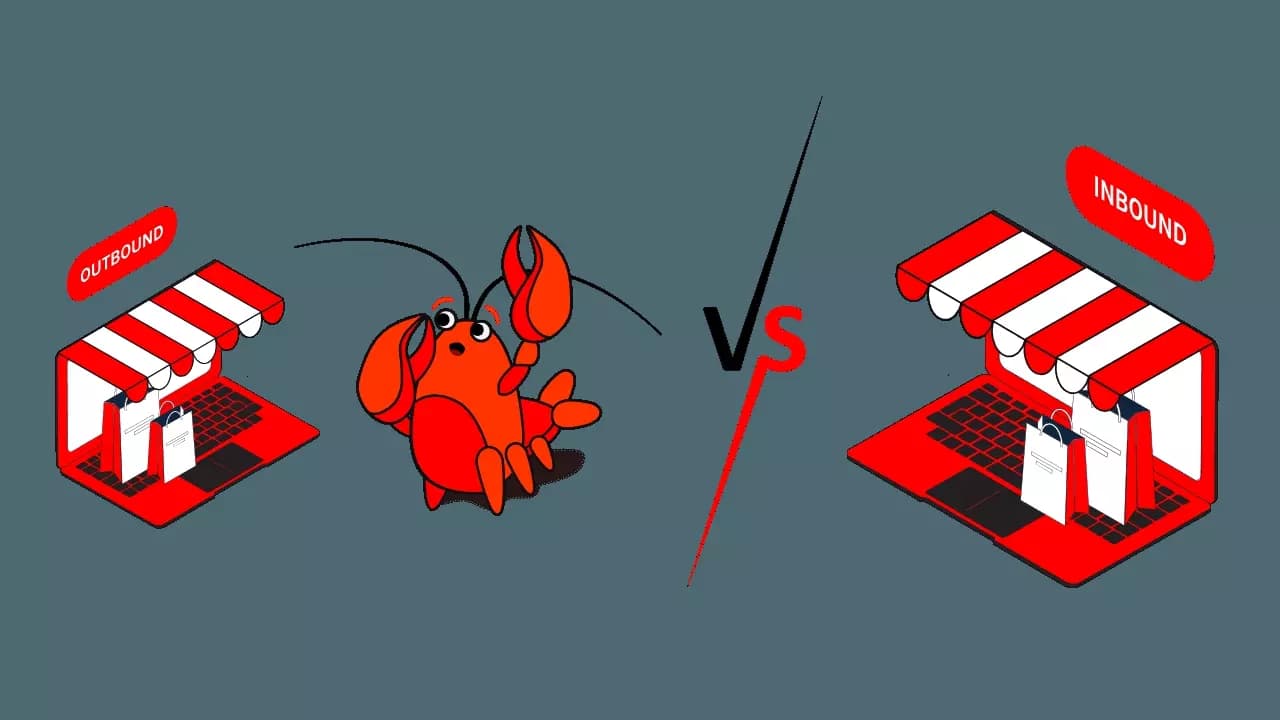
- Outbound: You walk around with a tray of lemonade, asking everyone if they want some. (You reach out to potential customers)
- Inbound: You set up a lemonade stand with a big, colorful sign. People walking by who are thirsty see the sign and come to you. (You attract customers)
Now let’s move to the strategies. Since outbound lead generation typically comes before inbound, we’ll start with outbound and move to inbound strategies.
Best outbound SaaS lead generation strategies
In the early stages, many potential customers may not be aware your business exists. Outbound methods can introduce them to your brand, product or service.
Here are 6 most effective outbound lead generation strategies for B2B SaaS companies.
- Cold emails
- Cold calling
- Account-Based Marketing (ABM)
- Partnerships and Affiliates
- Industry Events
- Paid ads (search and social)
Let’s explore them one by one.
1. Cold emails
Cold emails are a powerful outbound lead generation strategy when executed correctly.
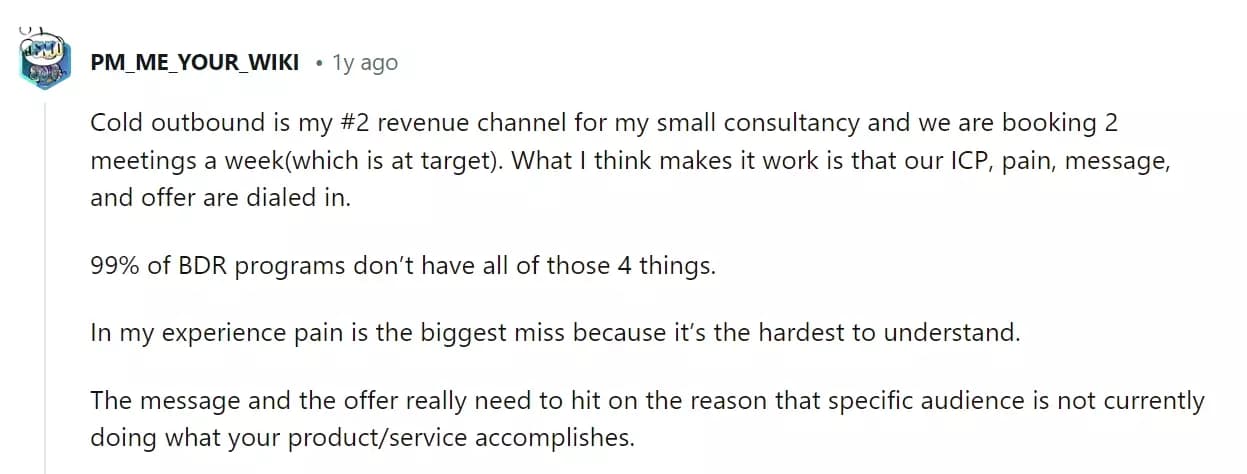
This method involves sending personalized and targeted emails to potential customers who have not previously interacted with your business.
He sent 1000 cold emails to C and VP-level executives from the Fortune 500 and still got a 1.7% response rate.
But I mentioned “executed correctly”, what’s the best way of using cold emails strategy?
How to do it perfectly?
A perfect cold emailing process has 3 simple steps.
- Finding emails of potential leads
- Crafting a compelling email copy
- Following up
How to find emails of potential leads?
Finding the right emails of potential leads is crucial for a successful cold email campaign. There are many ways to find emails of your potential leads.
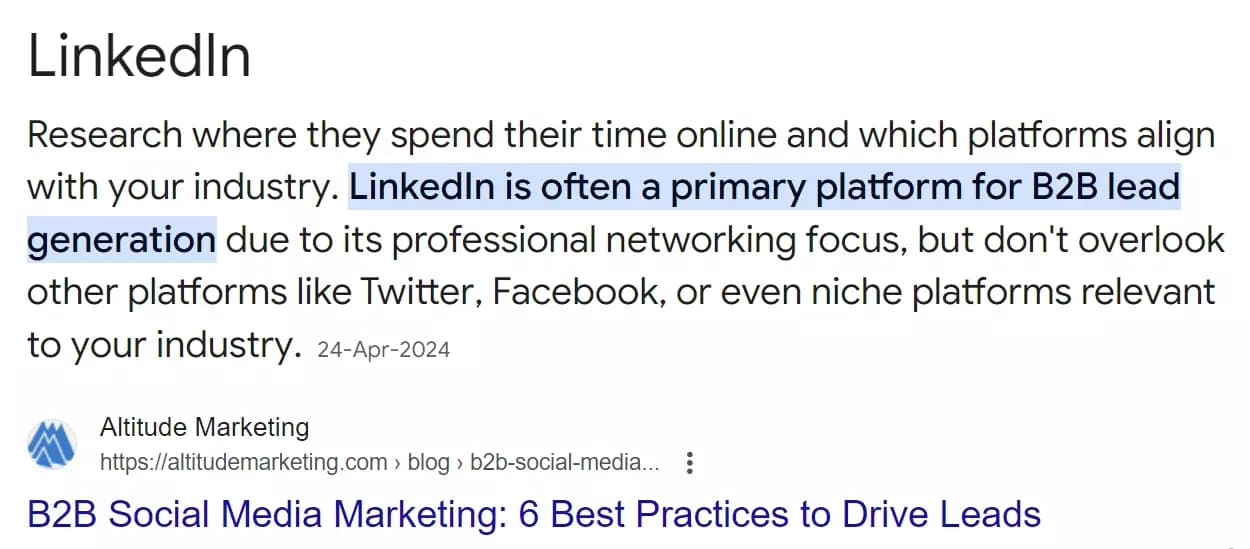
Or even better, use LinkedIn Sales Navigator. This tool offers advanced filtering options and helps you identify key decision-makers.
But how do I gather the email addresses of my potential leads from Sales Navigator?
That’s where Lobstr.io comes to the rescue. You can use our Sales Navigator Leads Scraper to scrape leads data including emails and phone numbers.
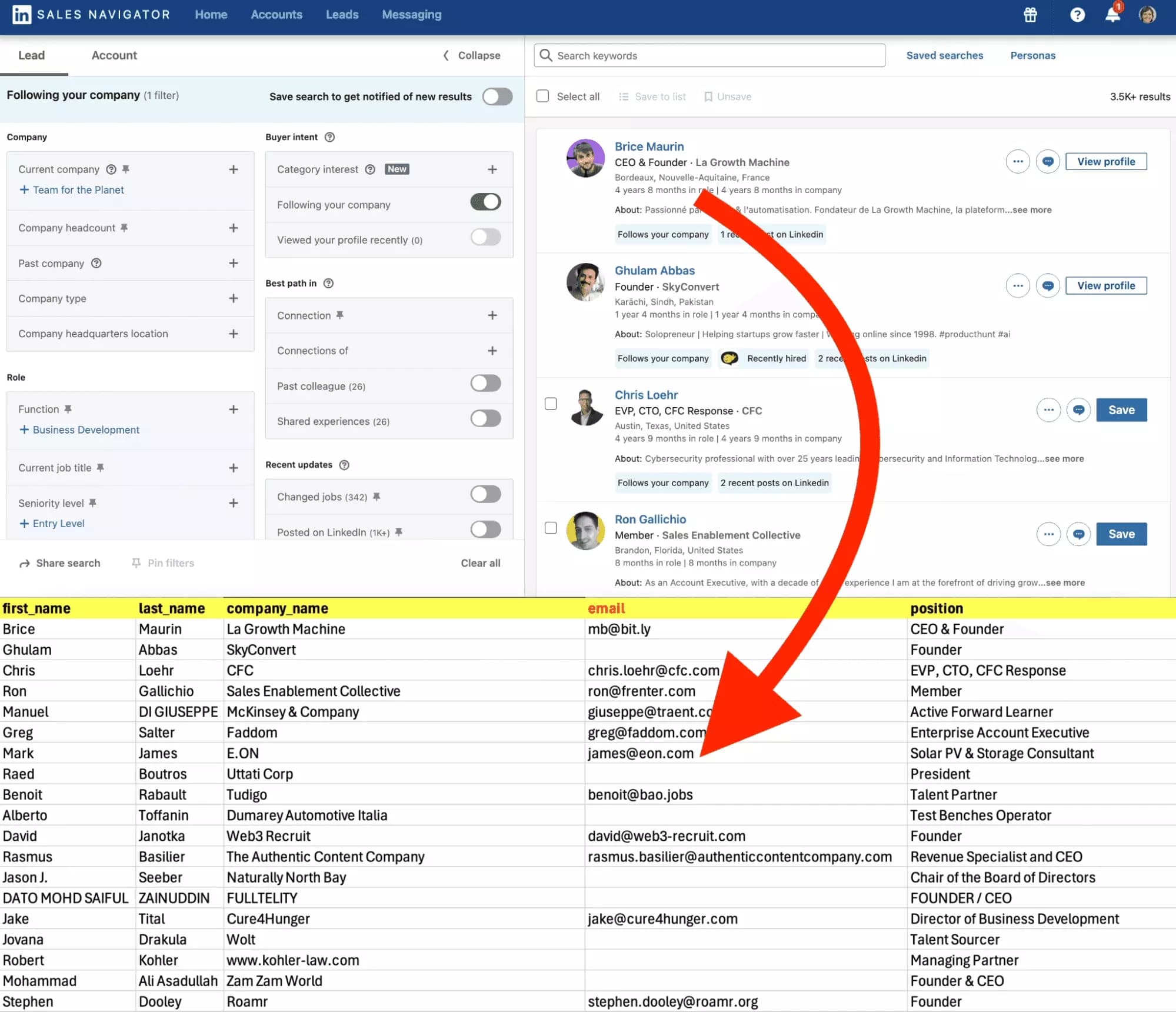
- It collects 25+ vital data points about each profile
- Enriches the data with valid work emails
- Scrapes 100+ profiles per minute
- Runs in cloud, no installation required
- Has schedule feature for repeated data collection
- Can export data directly to Google Sheets and Amazon S3
- LinkedIn Outreach: 10+ Tips from Reddit Experts
- Use Google to Find LinkedIn Profiles + Emails [2024]
- LinkedIn People Directory: a Complete Overview [2024]
Now that I have emails, how do I craft a powerful cold email copy?
How to craft a cold email copy?
A cold email copy needs to be engaging and persuasive. You need 5 ingredients to craft a compelling email copy.
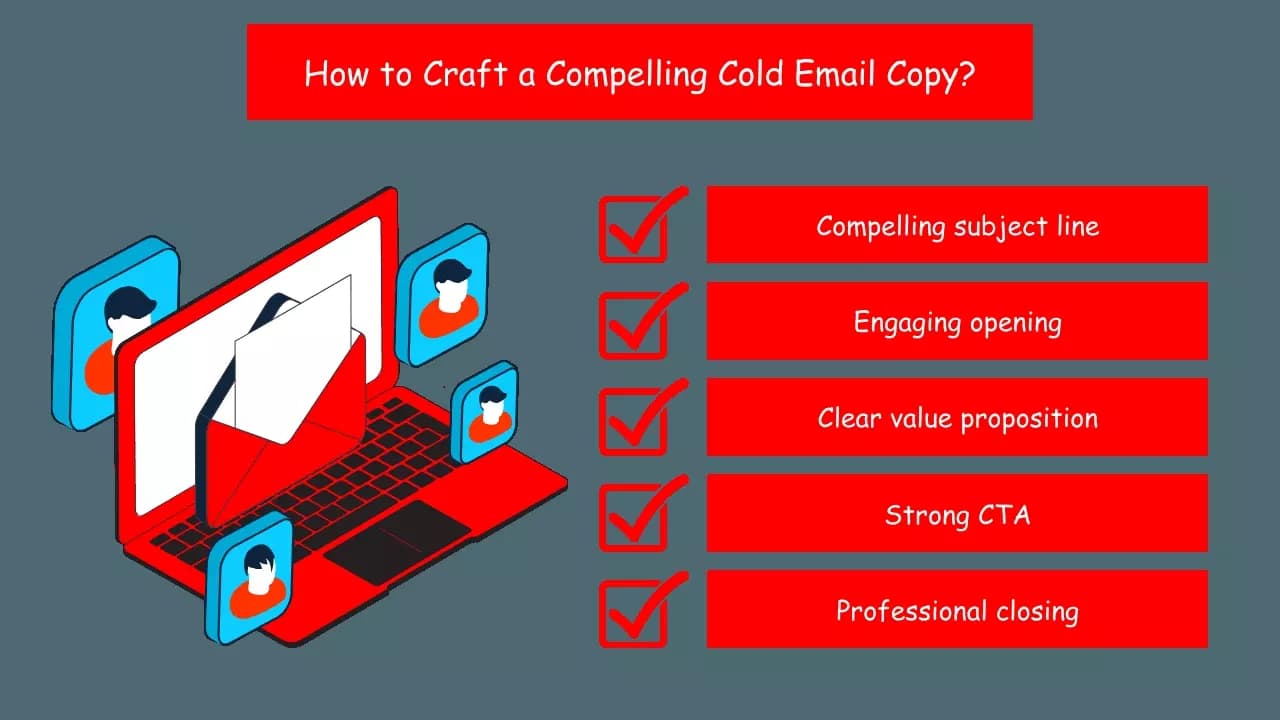
- Compelling subject line
- Engaging opening
- Clear value proposition
- Strong CTA
- Professional closing
Here’s the recipe.
Subject line
Aim for a subject line that is concise and to the point, ideally under 50 characters. Use the recipient’s name or company name to grab their attention.
Create curiosity or highlight value by hinting at the benefit or value they’ll receive, or ask a relevant question.
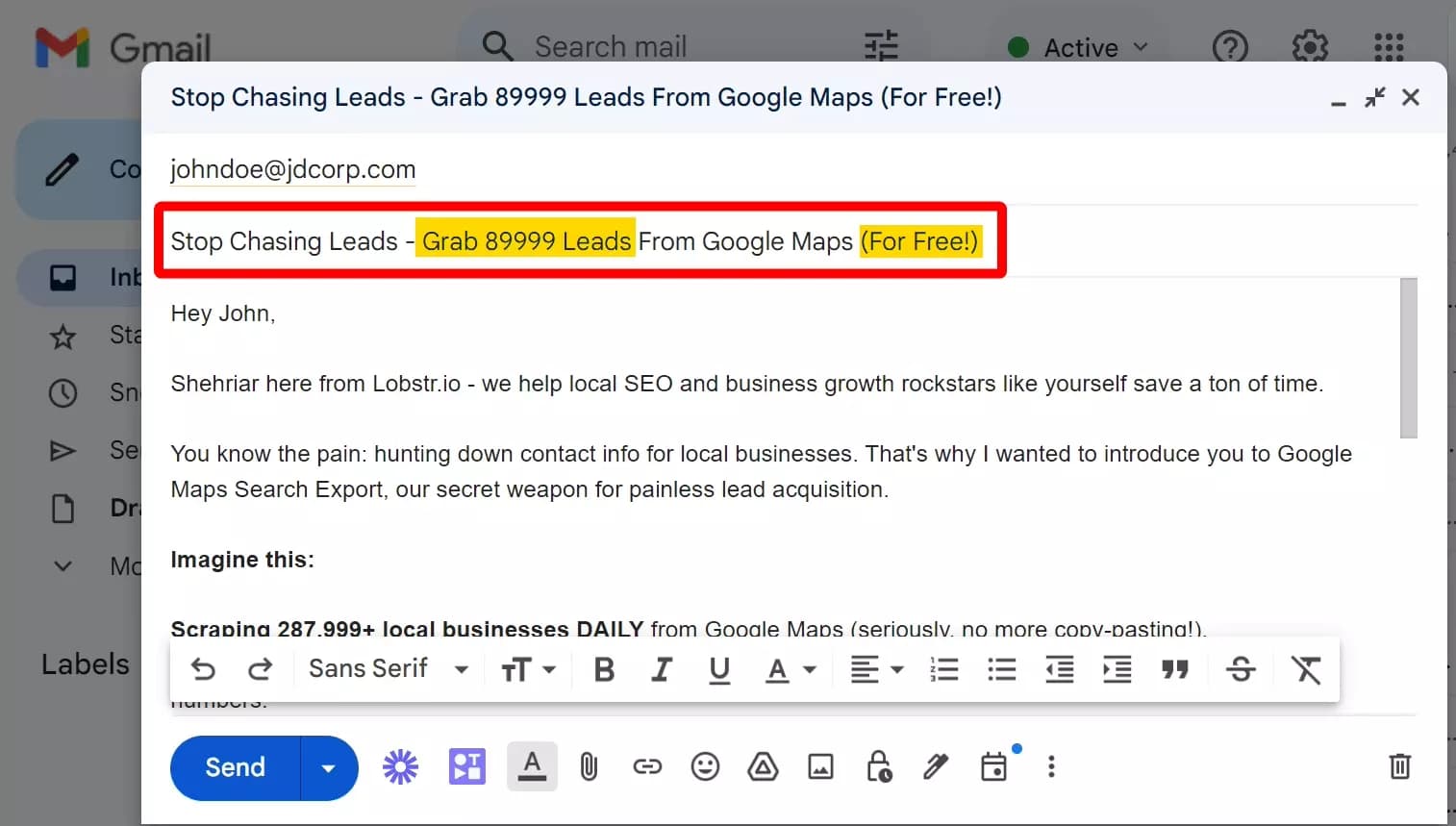
Engaging opening
Address the recipient by their first name and start with a statement or question relevant to their business or challenges.
Mention how you found them or why you’re reaching out to establish a connection.
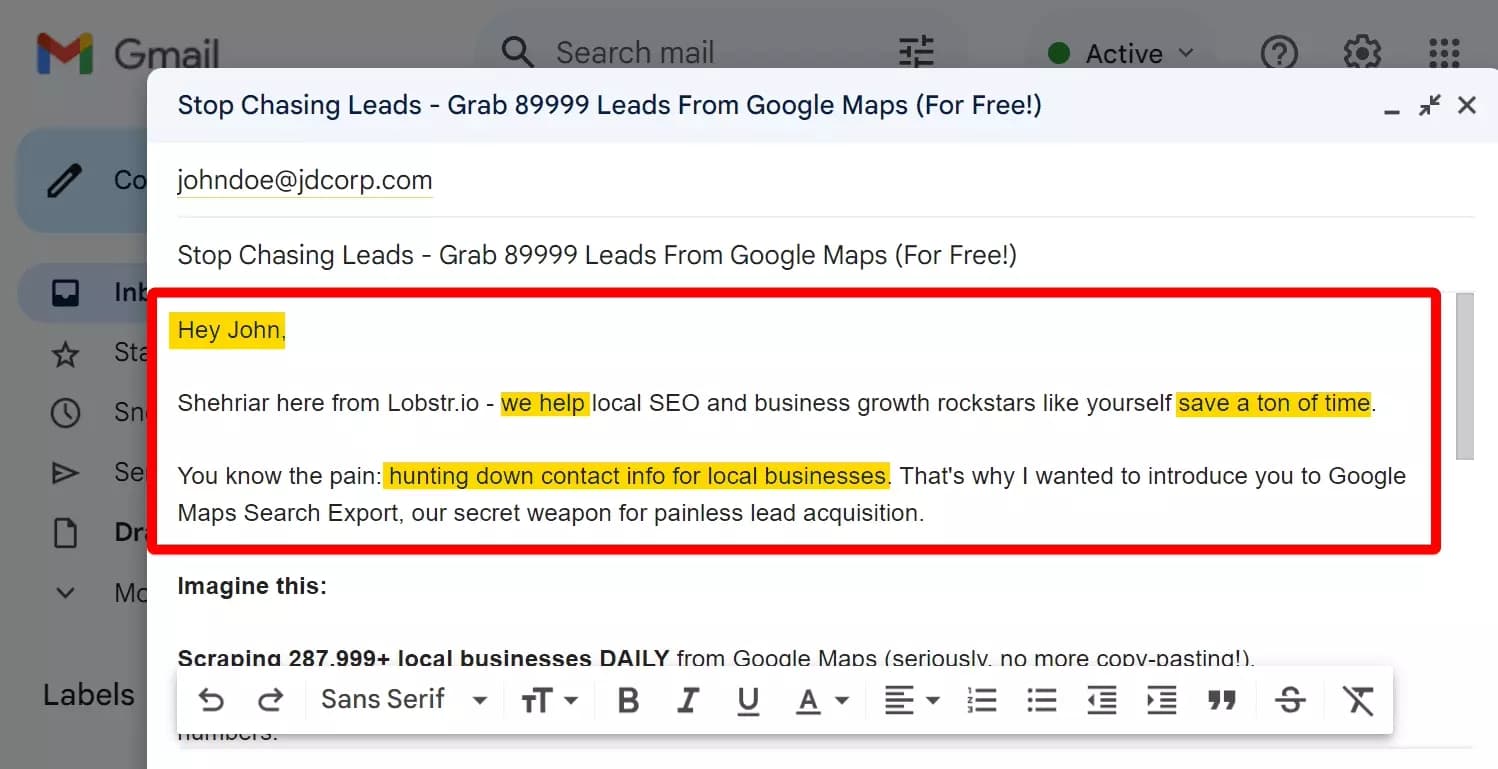
Value proposition
Explain what your product or service does clearly and concisely. Focus on your product's specific benefits and outcomes, rather than just features.
Break down key benefits into bullet points for easy readability. Acknowledge their pain points and position your solution as a helpful tool.
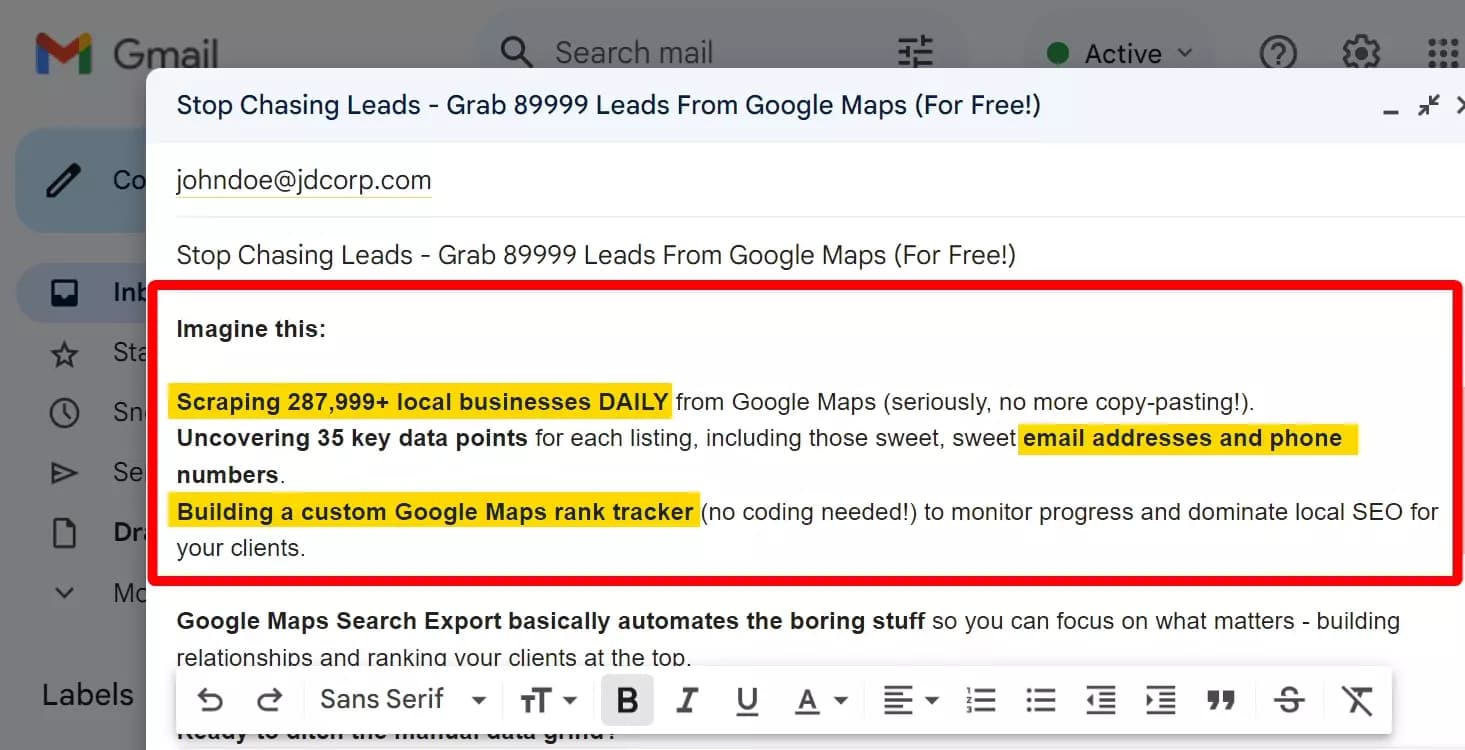
Professional closing
Thank the recipient for their time and consideration. Provide your name, position, and contact details.
You can use AI tools like ChatGPT and Gemini to write engaging cold email copies.
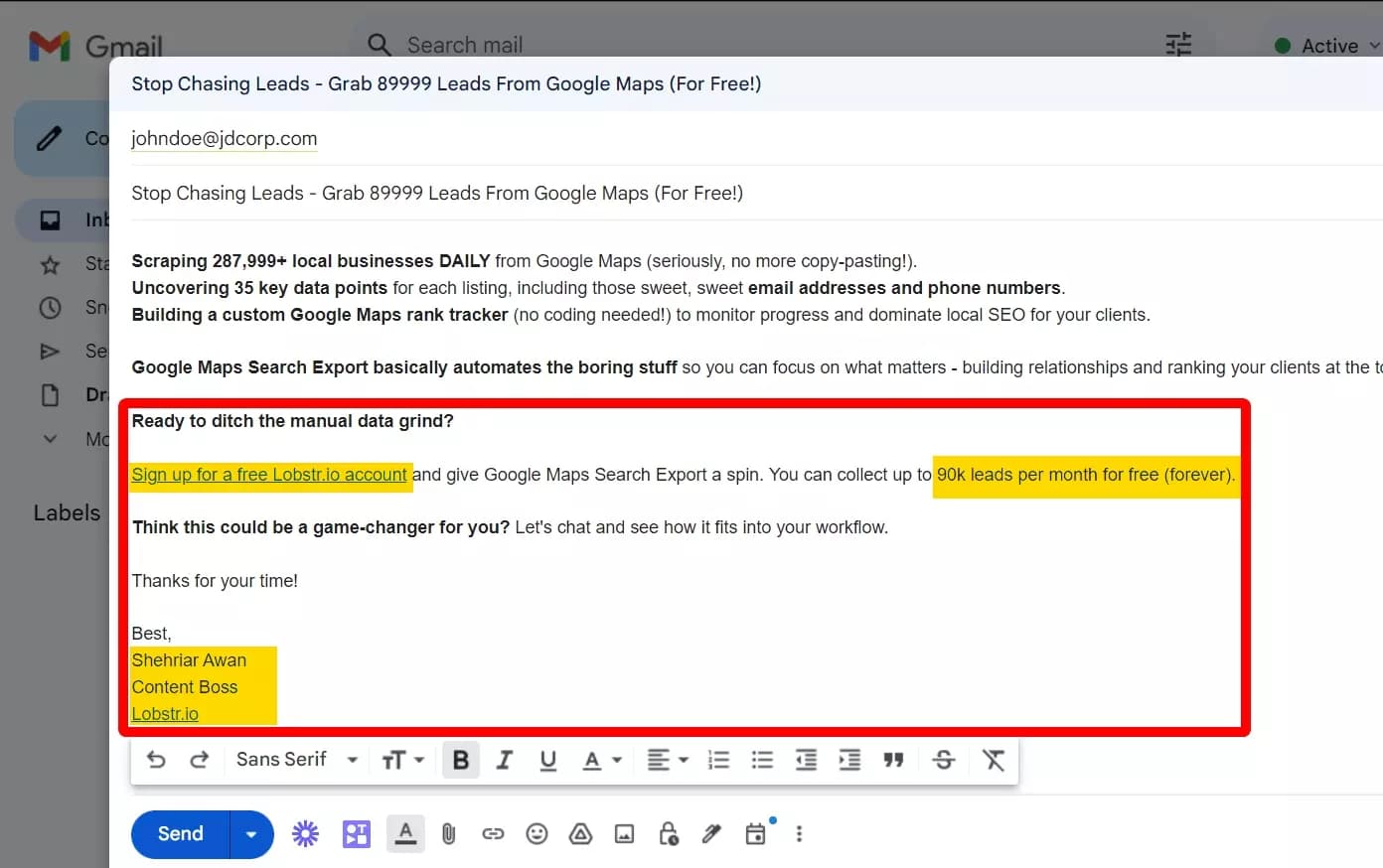
Let’s cook!
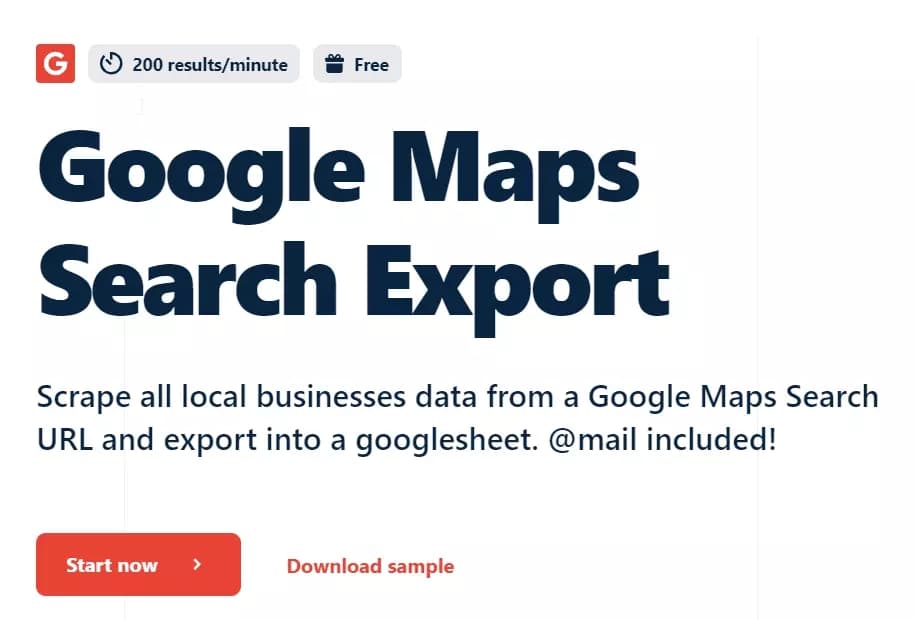
Let’s write a cold email copy to pitch this product to potential leads.
I’m going to use both ChatGPT and Gemini and choose the best response as our email copy.
Let’s build a prompt first.
Write an engaging and persuasive cold email to promote our SaaS product. You'll follow my 5 step formula to create the email copy based on details I provide. Here are the details: ## Product details: - Product Name: Google Maps Search Export - Product Short Description: Scrape all local businesses data from a Google Maps Search URL and export into a google sheet. @mail included! - Company Name: Lobstr.io - Industry of my targeted leads: Local SEO, Local Business Growth Experts ## The formula 1. Compelling subject line: Reach out to 89999 local businesses for free 2. Engaging opening: Address the recipient by their first name and start with a statement or question relevant to their business or challenges. Mention why I'm reaching out to establish a connection. 3. Clear value proposition: - Scrape 287999+ local business listings from Google Maps daily with our most popular plan - Collect 35 key data points including emails and phone numbers from every Google Maps business listing - Build a personalized Google Maps rank tracker using this no-code scraper 4. Strong CTA: Signing up for a Free account 5. Professional closing: Thank the recipient for their time and consideration. Provide your name, position, and contact details.f
ChatGPT responded with this email copy:**
Subject: Reach out to 287,999 Local Businesses Daily --- Hi [Recipient's First Name], Are you looking to supercharge your local SEO efforts and connect with thousands of potential clients every day? I'm reaching out because I believe our tool at Lobstr.io can be a game-changer for your business. **Introducing Google Maps Search Export:** - **Scrape 287,999+ local business listings from Google Maps daily**: Gain access to a wealth of information effortlessly. - **Collect 35 key data points**: Including emails and phone numbers from every Google Maps business listing. - **Build a personalized Google Maps rank tracker**: All with this no-code scraper, making it easier than ever to track and optimize your local SEO. Ready to take your local SEO game to the next level? Sign up for a free account today and see the impact for yourself! Thank you for your time and consideration. I look forward to helping you grow your business. Best regards, [Your Name] [Your Position] Lobstr.io [Your Contact Information]f
But Gemini really nailed it with this amazing cold email copy:**
## Subject: Stop Chasing Leads - Grab 89999 Leads From Google Maps (For Free!) Hey [First Name], [Your Name] here from Lobstr.io - we help local SEO and business growth rockstars like yourself save a ton of time. You know the pain: hunting down contact info for local businesses. That's why I wanted to introduce you to Google Maps Search Export, our secret weapon for painless lead acquisition. **Imagine this:** * **Scraping 287,999+ local businesses DAILY** from Google Maps (seriously, no more copy-pasting!). * **Uncovering 35 key data points** for each listing, including those sweet, sweet **email addresses and phone numbers.** * **Building a custom Google Maps rank tracker** (no coding needed!) to monitor progress and dominate local SEO for your clients. **Google Maps Search Export basically automates the boring stuff** so you can focus on what matters - building relationships and ranking your clients at the top. **Ready to ditch the manual data grind?** Sign up for a free Lobstr.io account and give Google Maps Search Export a spin. You can collect up to 90k leads per month for free (forever). **Think this could be a game-changer for you?** Let's chat and see how it fits into your workflow. Thanks for your time! Best, [Your Name] [Your Position] [Your Contact Information] (Website, Email)f
We can further customize it by adding links, playing around with the subject line and other elements.
I’d add links to our Google Maps scraping related articles to improve our chances of redirecting leads to our website.
Final step is following up.
How to follow up perfectly?
Many potential leads may not respond to your initial email due to various reasons such as a busy schedule or simply overlooking the message.
A well-timed follow-up can remind them of your offer and increase the chances of engagement.
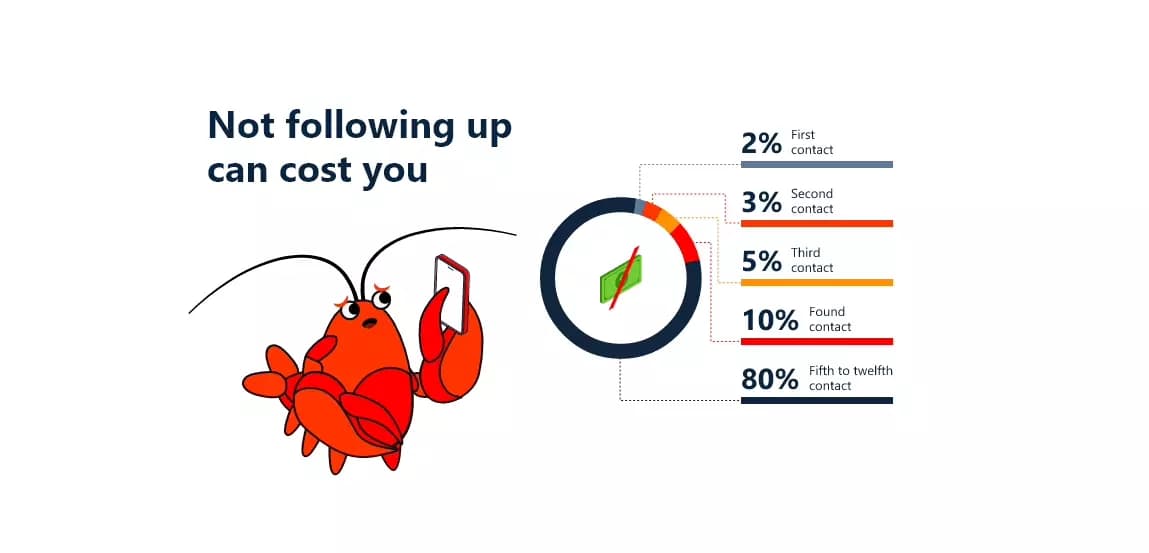
Here are some tips for a perfect follow up email.
- Send a follow-up email 3-5 days after your initial email
- Keep your follow-up emails concise and courteous
- Mention your previous email to jog their memory and provide context
- Include new information or a different angle that might interest the recipient
Here’s an example follow up email I crafted using ChatGPT:
Hey [First Name], Remember that email I sent about Google Maps Search Export? The tool that magically turns Google Maps into a lead-generating machine? Totally understand if my previous email slipped through the cracks. No worries at all!. Imagine having a bottomless well of local business data at your fingertips. No more manual searches, promise! Want to give it a whirl? Here's the link: [Link to product page] Let me know if you have any questions.f
Another great outbound lead generation strategy is cold calling.
2. Cold calling
It’s similar to cold emailing but here we don’t send emails. Cold calling involves reaching out to potential customers via telephone without any prior interaction.
Cold calling allows for immediate feedback and qualification. Several industries have traditionally leaned towards phone conversations for business interactions.
If your targeted industry prefers phone conversations, you should consider cold calling instead of cold emailing.
How to do it perfectly?
Just like cold email outreach, the cold calling campaign also follows the 3 step process.
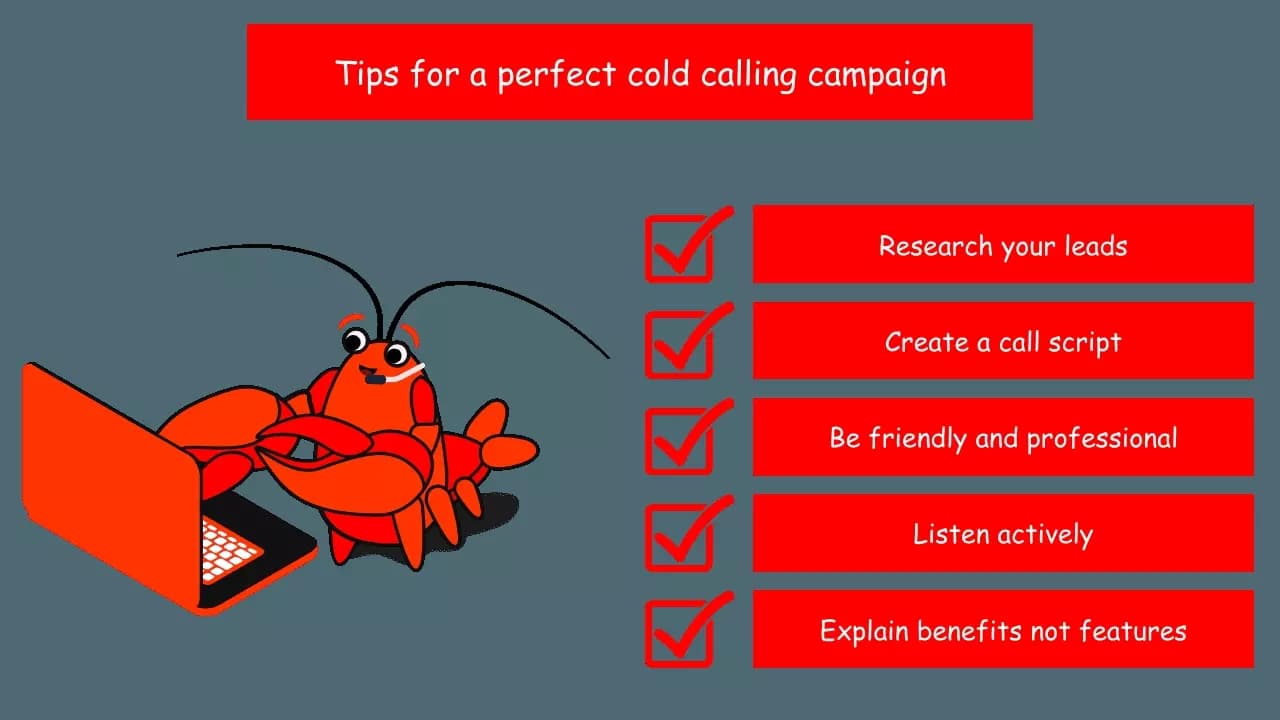
- Preparing for the call
- Making the call
- Following up after the call
Preparing for the call
In the prep stage, research your leads. Understand their industry, company size, and specific pain points they might be facing.
You’ll need to create a call script. The script should include an engaging introduction, key talking points about your SaaS product, and questions to understand the lead’s needs better.
Making the call
Once you are on the call, start with a friendly and professional greeting. Introduce yourself and your company, and quickly establish the purpose of your call.
## Example "Good morning/afternoon, [Prospect's name]. This is [Your Name] from [Company Name]. I'm reaching out because I noticed [Company Name] is in the [Industry] sector."f
Engage the prospect by asking relevant questions about their business. Listen actively and show genuine interest in their responses.
## Example "I understand that [Company Name] specializes in [Specific area]. Can you tell me a bit more about your primary challenges in [Specific area]?"f
Clearly and concisely explain how your SaaS product can solve their specific problems. Focus on the benefits and outcomes rather than just the features.
## Example "We've helped businesses like yours [mention similar clients] improve [metric] by [percentage] through our [product/service]. I think we could potentially do the same for you."f
Follow up after the call
After the call, request a follow-up call and send an email summarizing the key points discussed and confirming any agreed-upon next steps.
## Example "To recap, we've discussed how our [product/service] can help [Company Name] address [pain point]. I'd love to schedule a brief follow-up call to dive deeper into your specific needs. Are you available next week?"f
But we missed the most important point. How to find phone numbers of our potential leads?
How to find phone numbers of potential leads using Lobstr.io?
You can manually find phone numbers of your leads by searching different business directories and social media.
Why do manual efforts when we can automate phone number collection?
You can use Google Maps Search Export to collect not only emails but also phone numbers of local businesses.
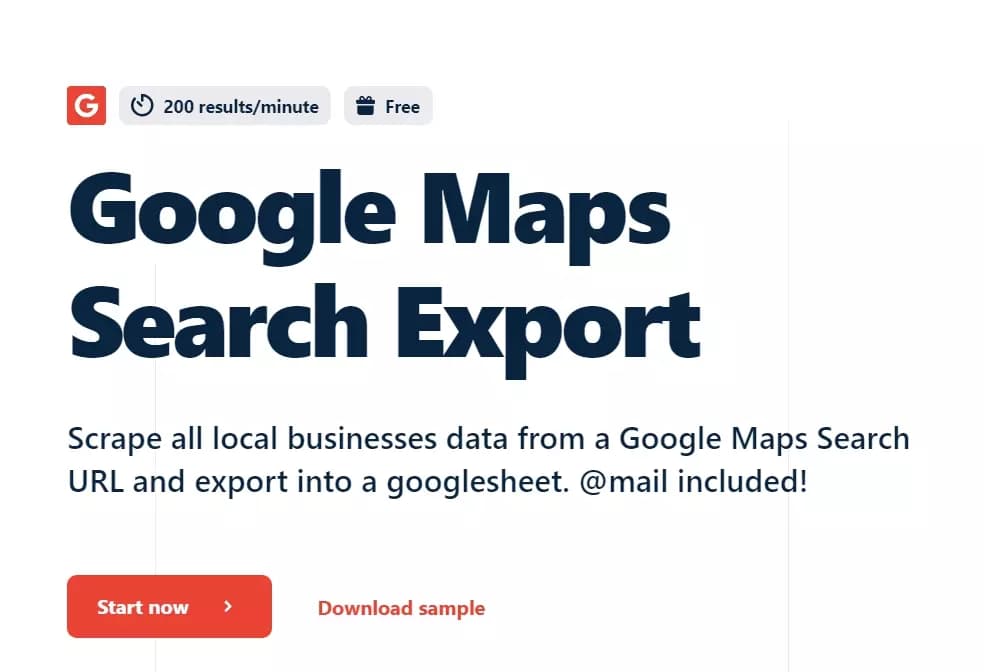
- Scrape 35+ key data points
- Enrich data with emails and phone numbers
- Scrape any location with any filter
- Export data directly to Google Sheet
- Scrape up to 200 results per minute
Since this scraper gives you both the phone and email of your potential lead, you can call and send a follow up email easily.
3. Account-Based Marketing (ABM)
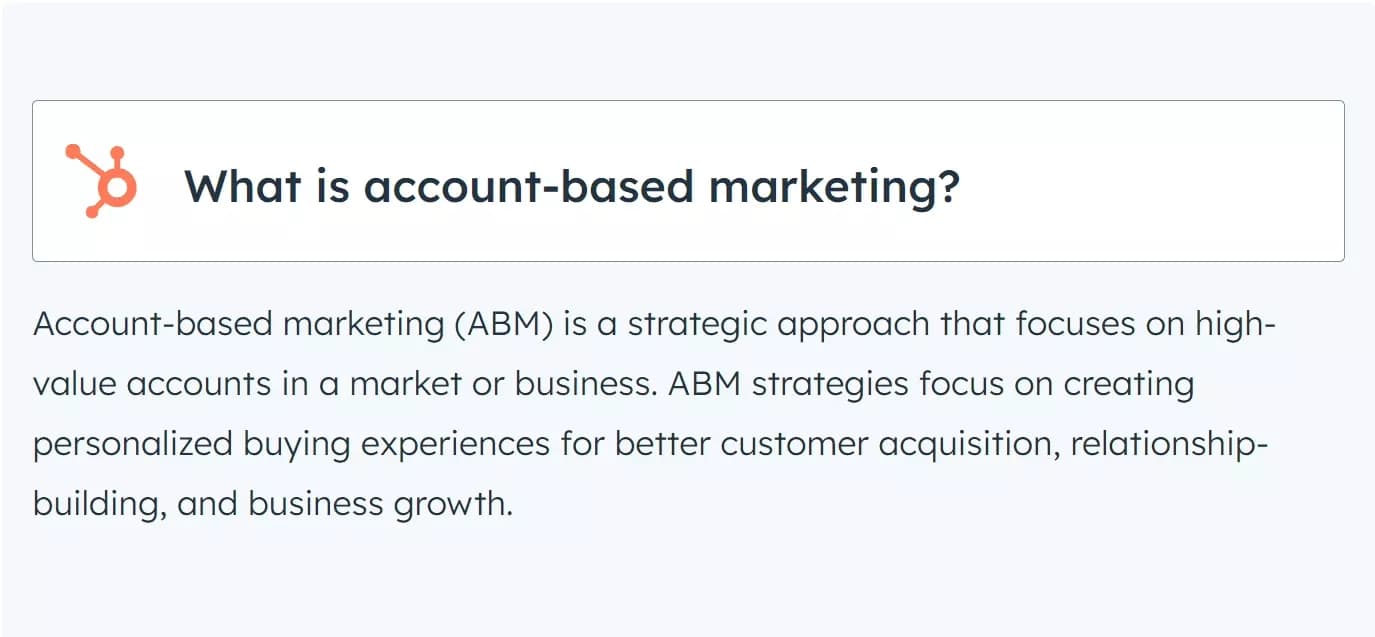
ABM is like sending personalized gift baskets to your selected neighbors instead of handing out flyers to everyone on the block.
Think of it as treating each potential customer like a VIP. You tailor your marketing and sales efforts directly to their specific needs and interests.
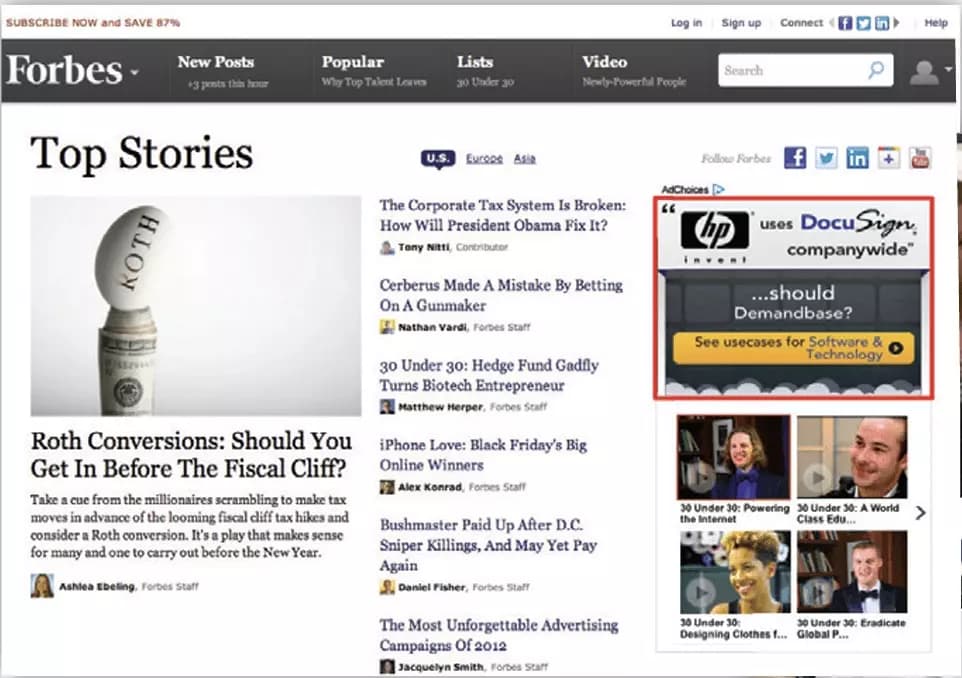
The company created display ads with highly-personalized messages, targeted to 450 enterprise level accounts from 6 industries.
As a result, they saw a 22% increase in the sales pipeline with 300% increase in page views while decreasing the bounce rate from 39% to 14%.
How to do it perfectly?
Here are some tips to do ABM like a champ.
- Figure out the type of customer you want to work with
- Understand what your target customers need and want
- Get your sales and marketing teams to work as a team
- Create messages that speak directly to each customer's problems
- Keep an eye on what's working and what's not
- Spend more time on customers who are most likely to buy
- Always look for ways to make your ABM strategy better
4. Partnerships and Affiliates
You can partner with other businesses or individuals who can promote your SaaS product to their audience in exchange for a commission or other benefits.
Best examples of this strategy are companies like Shopify and Hostinger.
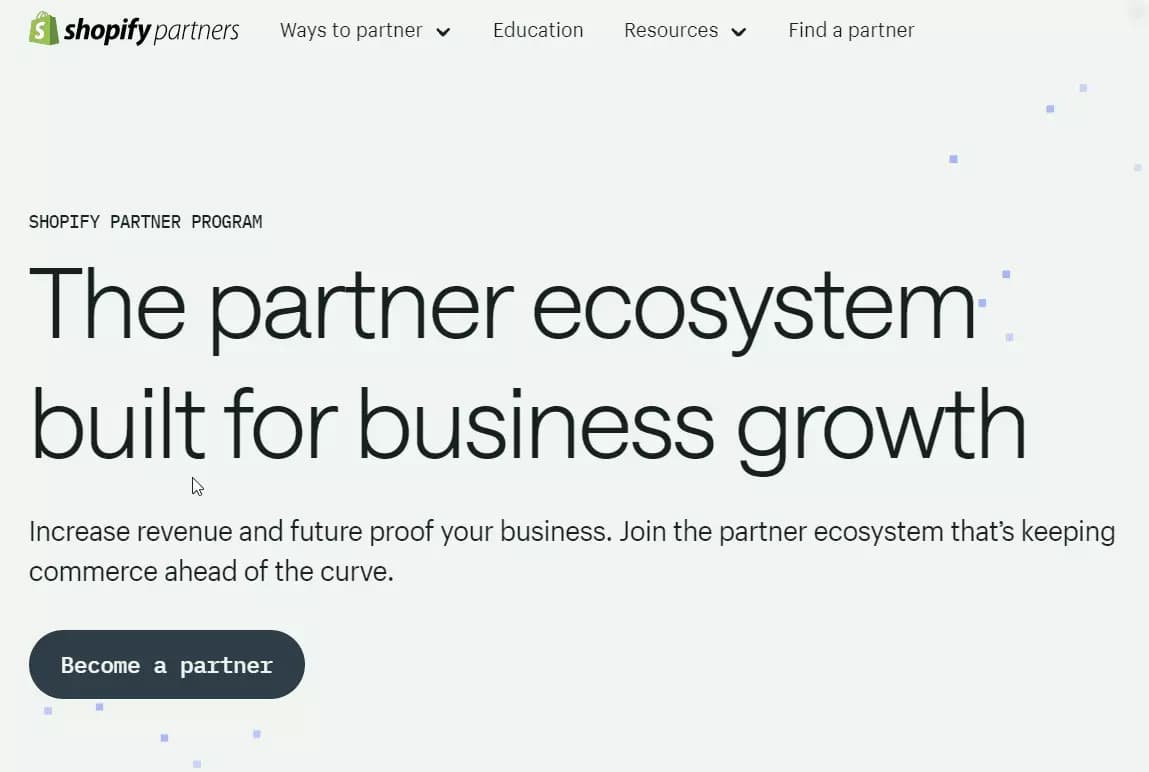
They offer partnership/referral programs where web developers and IT companies can get commission for every client they bring to these platforms.
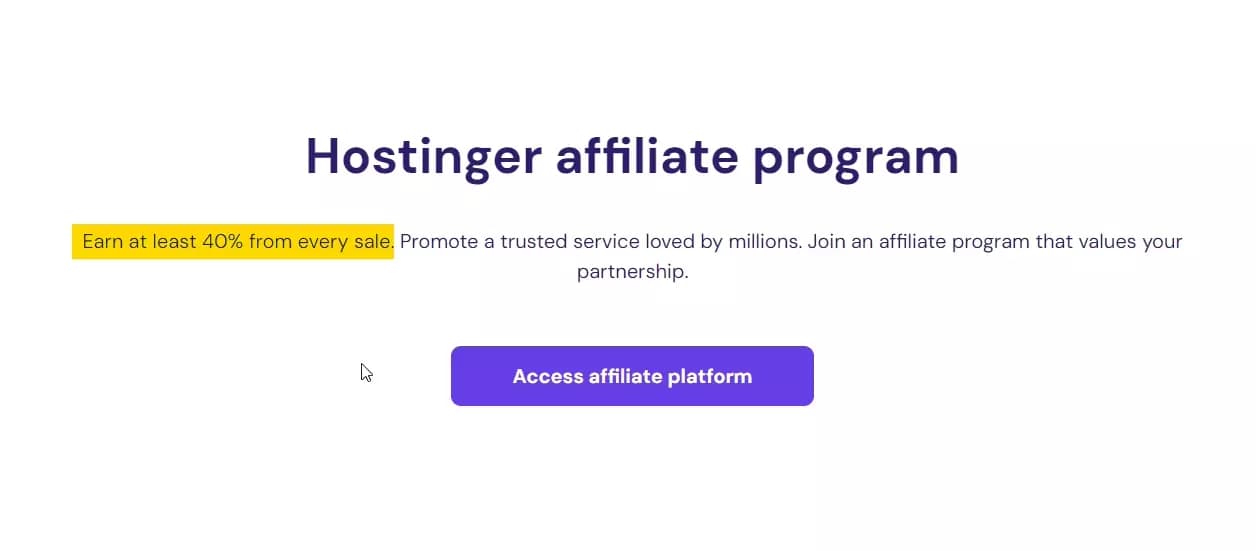
How to do it perfectly?
- Look for companies, influencers, or industry experts with an audience that aligns with your target market
- Develop an attractive commission structure or incentive for your partners
- Equip your partners with promotional resources making it easy for them to promote your SaaS product effectively
- Establish strong, mutually beneficial relationships with your partners
- Use tracking tools to monitor the performance of your partnerships and affiliate campaigns
5. Industry Events
Industry events, such as conferences, trade shows, and webinars, are opportunities to showcase your SaaS product and network with potential leads.
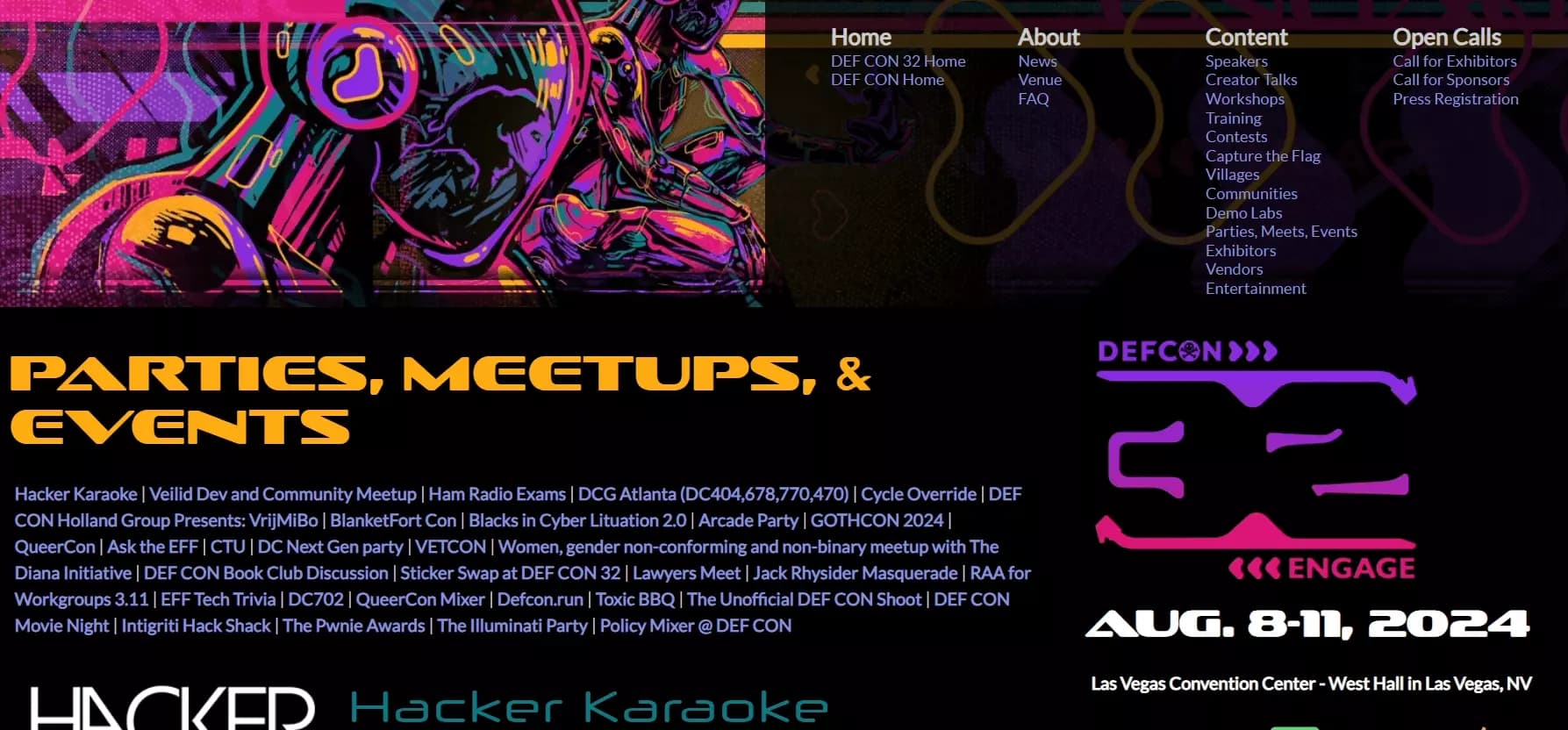
How to do it perfectly?
- Choose events where your target audience is present
- Create engaging presentations, demos, or workshops focused on your product's benefits
- Announce your participation through your website and social media
- Interact with participants, answer questions, and collect contact information
- Send personalized follow-up messages with additional information and demo invitations
6. Paid ads (search and social)
This simply means paying for advertisements to reach potential leads who are actively searching for solutions or who match specific audience criteria.
This strategy allows you to target and attract high-quality leads quickly. At Lobstr.io, we also use Google ads actively to get high quality leads.
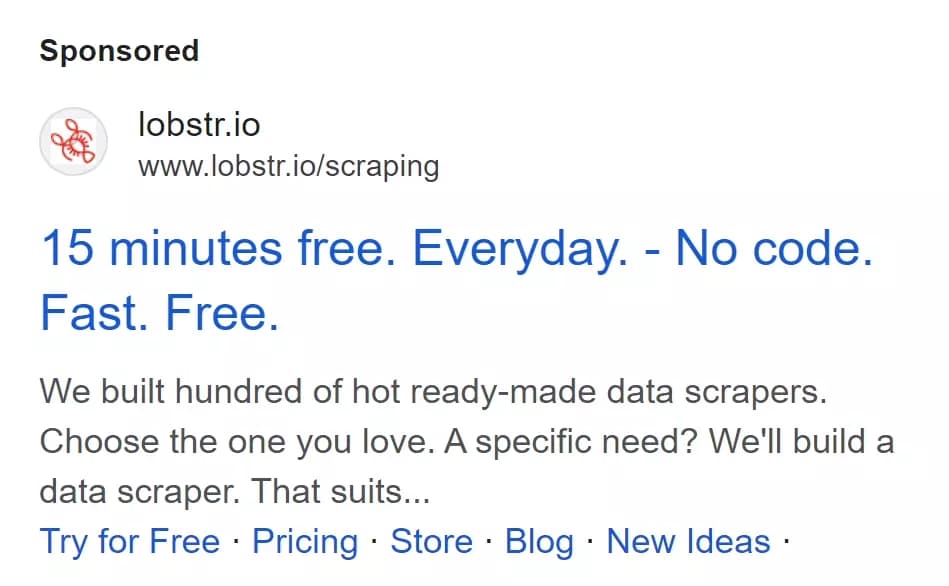
How to do it perfectly?
- Use interest-based targeting to reach your ideal customer profile
- Design eye-catching ads with a clear value proposition and strong call-to-action
- Make sure your ad copy addresses the needs and pain points of your target audience
- Your ads should direct traffic to well-designed landing pages with relevant content and a clear CTA
- Adjust your targeting, ad copy, and budget based on performance data to improve results
These were top 6 most effective outbound strategies for B2B SaaS lead generation. Now let’s move to the inbound strategies for generating leads.
Best inbound SaaS lead generation strategies
Inbound lead generation focuses on drawing prospects to your brand by offering valuable content and experiences.
Unlike outbound methods, which push your message to potential leads, inbound strategies pull them in by addressing their needs and interests.
Here are 6 most effective inbound strategies for B2B SaaS for lead generation.
- Content Marketing
- SEO
- Email Marketing
- Social Media Marketing
- Freemium Model or Free Trials
- Live Chat and Chatbots
Let’s explore them one by one.
1. Content Marketing
Content marketing involves creating and sharing valuable, relevant content to attract and engage potential leads.
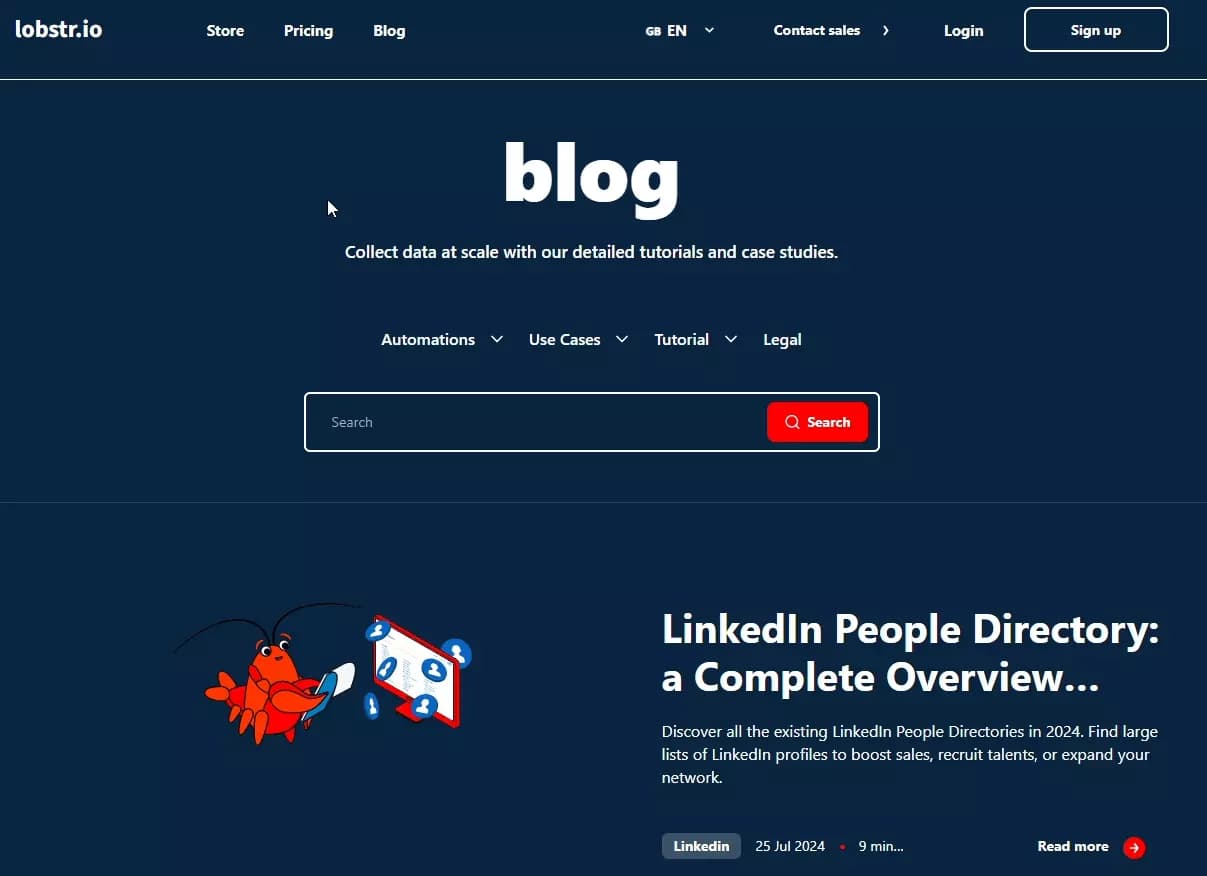
The goal is to provide insights and solutions that address the needs of your target audience, positioning your SaaS company as a thought leader in your industry.
Content is the backbone of B2B marketing and significantly contributes to brand awareness. HubSpot is a prime example of this.
How to do it perfectly?
- Develop content that addresses pain points and offers solutions
- Make sure your content is informative, actionable, and aligned with your audience’s needs
- Use SEO techniques to improve its visibility in search engines
- Share your content across platforms where your target audience is most active
- Include clear calls-to-action (CTAs) in your content
- Track the performance of your content using analytics tools
Related to content marketing, the second most important strategy is SEO.
2. SEO (Search Engine Optimization)
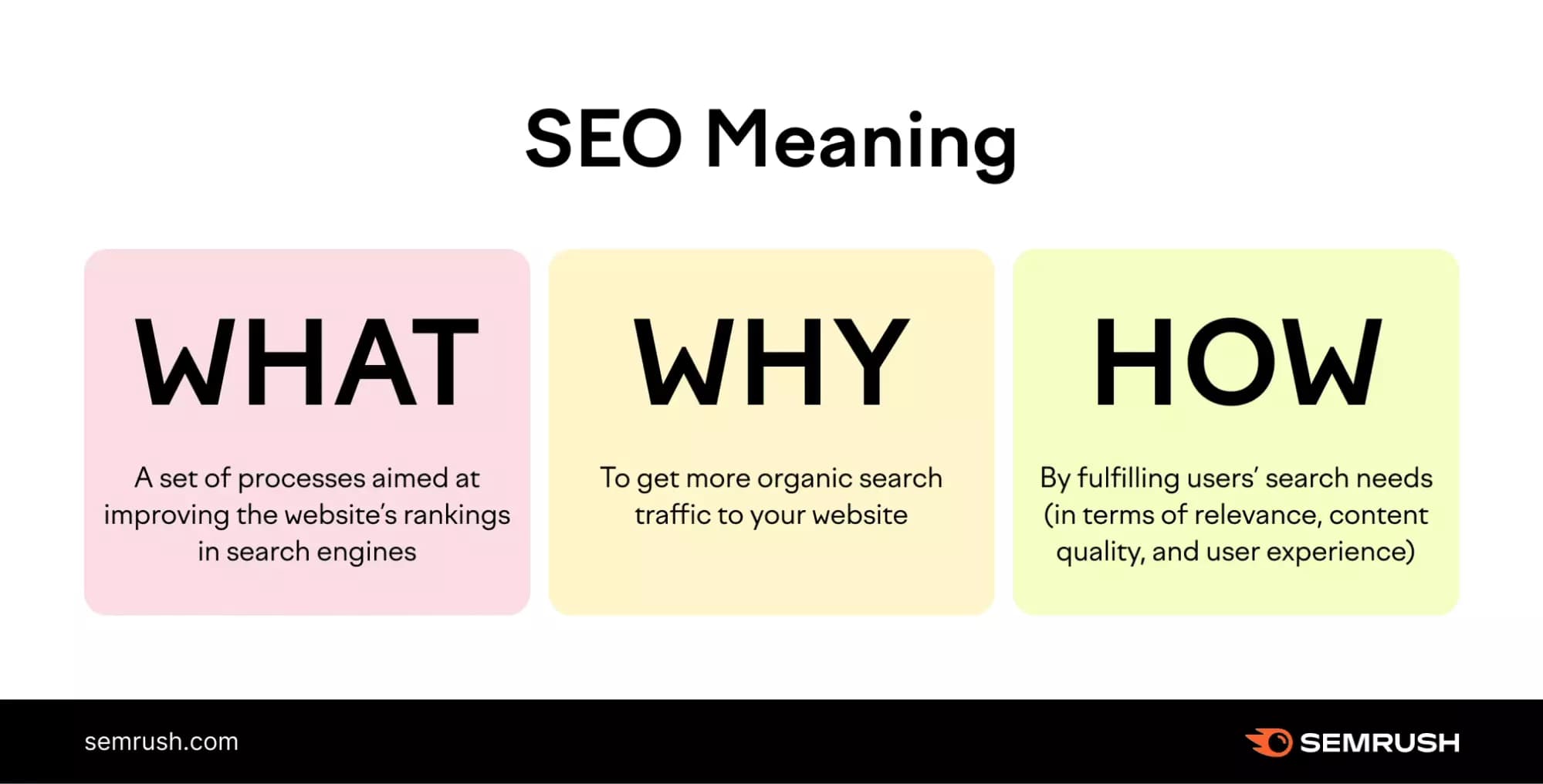
The goal is to attract organic traffic by ranking higher for relevant keywords that potential leads are searching for.
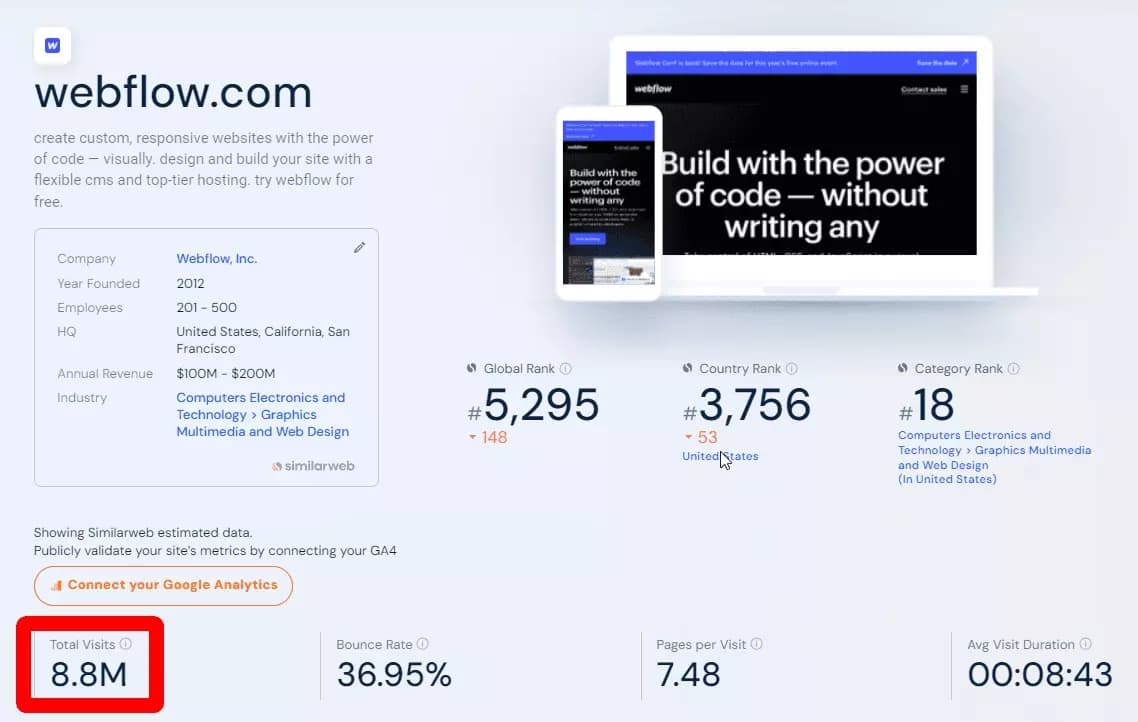
SEO can really help your SaaS product reach the right audience organically.
How to do it perfectly?
- Identify relevant keywords that your target audience is likely to search for
- Incorporate chosen keywords into key on-page elements
- Ensure your content is high-quality, informative, and addresses user intent
- Use internal linking to guide users to related content and improve site crawlability
- Acquire backlinks from reputable sites to increase your site’s authority
- Make sure your website loads quickly, is mobile-friendly and provides a seamless user experience
- Regularly review and update your SEO strategy based on performance data and algorithm changes
3. Email Marketing
Wait, we already covered this right? No, here we’re talking about inbound email marketing. It’s different from cold email outreach we discussed in outbound strategies.
Inbound email marketing targets existing leads or customers with personalized content based on their interests and behavior.
It focuses on nurturing and building relationships with leads who are already in your database.
An interesting strategy in email marketing is running drip campaigns.
What are Drip campaigns?
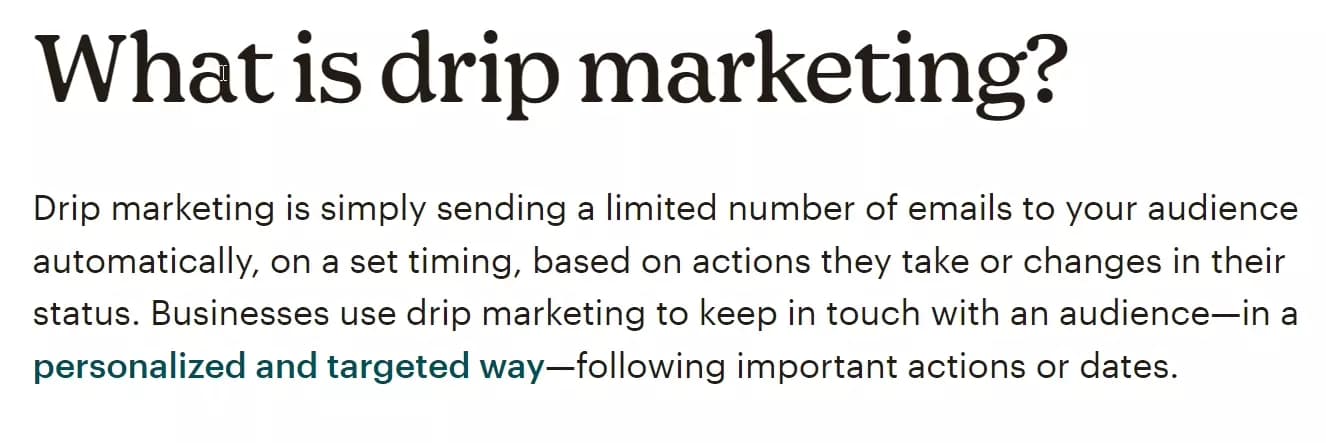
For example, if someone signs up for your newsletter, you might send them a welcome email, then a product suggestion, and later a discount code.
How to do it perfectly?
- Divide your email list into groups based on criteria like industry, behavior, or buyer’s journey
- Tailor your email content to address the specific needs and interests of each segment
- Address recipients’ pain points or interests
- Create compelling subject lines to increase open rates
- Include clear calls-to-action (CTAs) to encourage recipients to take the next step
- Monitor key metrics like open rates, click-through rates, and conversions
4. Social Media Marketing
Social media marketing involves using social media platforms to share content, engage with your audience, and attract potential leads.
For B2B SaaS, this often means creating and distributing content that demonstrates your expertise, builds brand awareness, and drives traffic to your website.
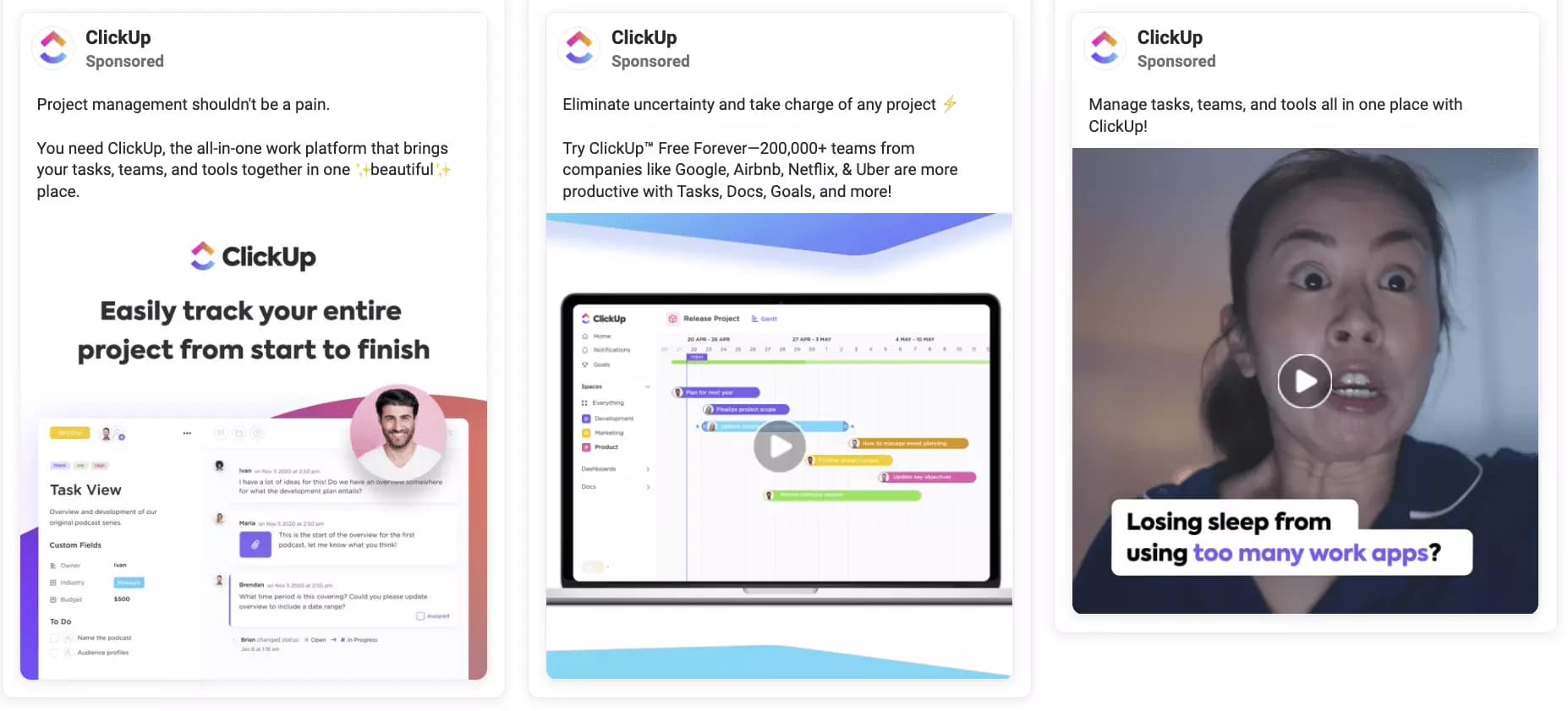
How to do it perfectly?
- Focus on platforms where your target audience is most active
- Share high-quality content that provides value to your audience
- Regularly post updates and interact with your followers
- Use relevant hashtags to increase the visibility of your posts
- Create targeted ad campaigns to reach specific audiences
- Conduct webinars and live Q&A sessions to demonstrate your expertise
- Track engagement metrics such as likes, shares, comments, and click-through rates
- Partner with industry influencers to expand your reach
- Plan and schedule your social media content in advance
5. Freemium Model or Free Trials
The freemium model and free trials allow potential customers to use a basic version of your SaaS product for free or to access the full product for a limited time.
This strategy gives users a hands-on experience with your product, demonstrating its value and encouraging them to upgrade to a paid plan.
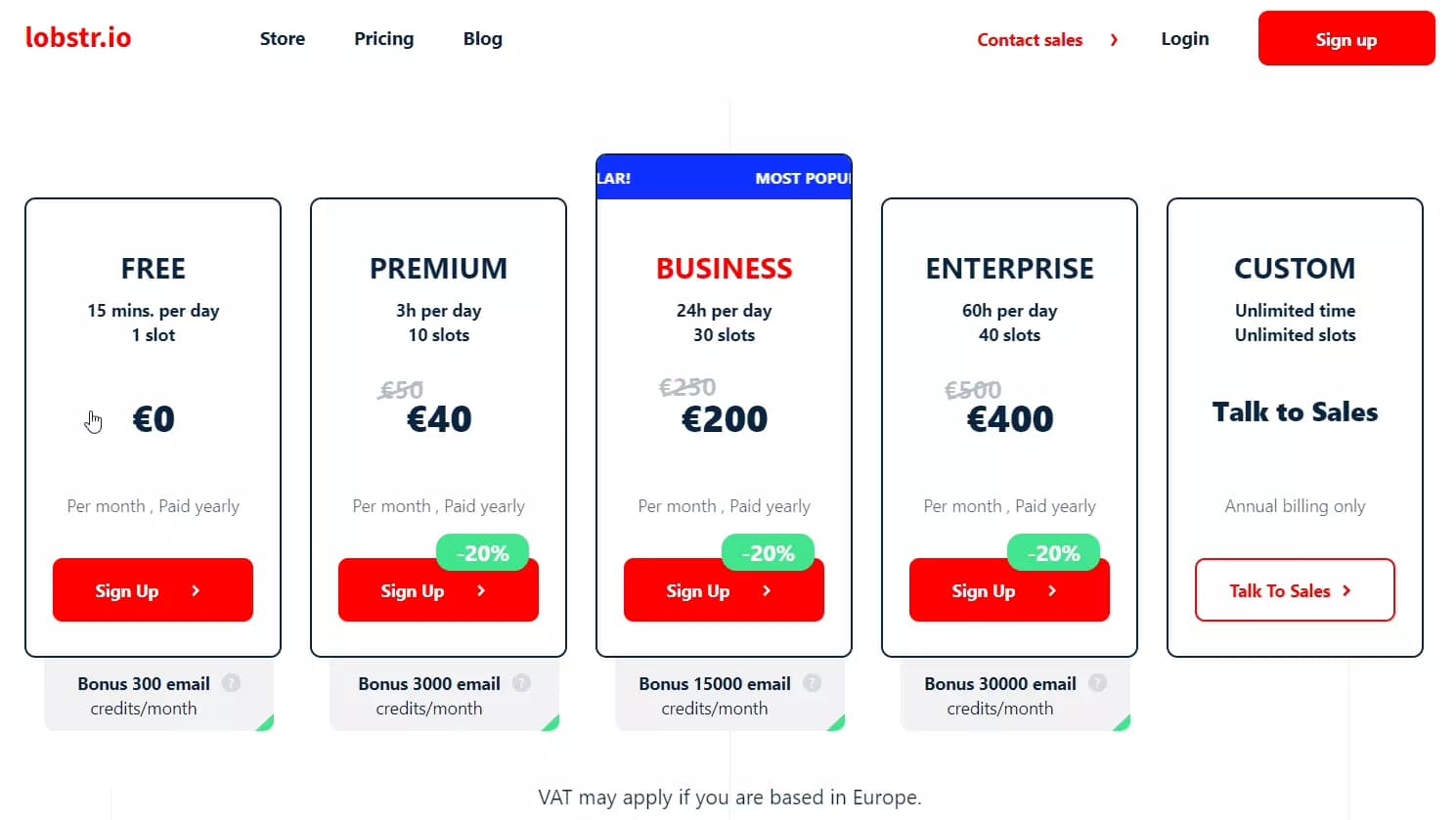
This helps new users experience our products which eventually converts them into paying customers.
How to do it perfectly?
- The free version or trial should provide real value
- Make it easy for users to sign up with minimal required information
- Offer tutorials and guides to help users get started and see value quickly
- Regularly showcase the additional benefits of premium features through in-app messages and emails
- Monitor how users interact with your product to identify those likely to upgrade
- Provide special promotions or discounts to encourage users to upgrade
6. Live Chat and Chatbots
Live chat and chatbots on your website provide real-time support and interaction with visitors. They help answer questions, guide users, and collect lead information.
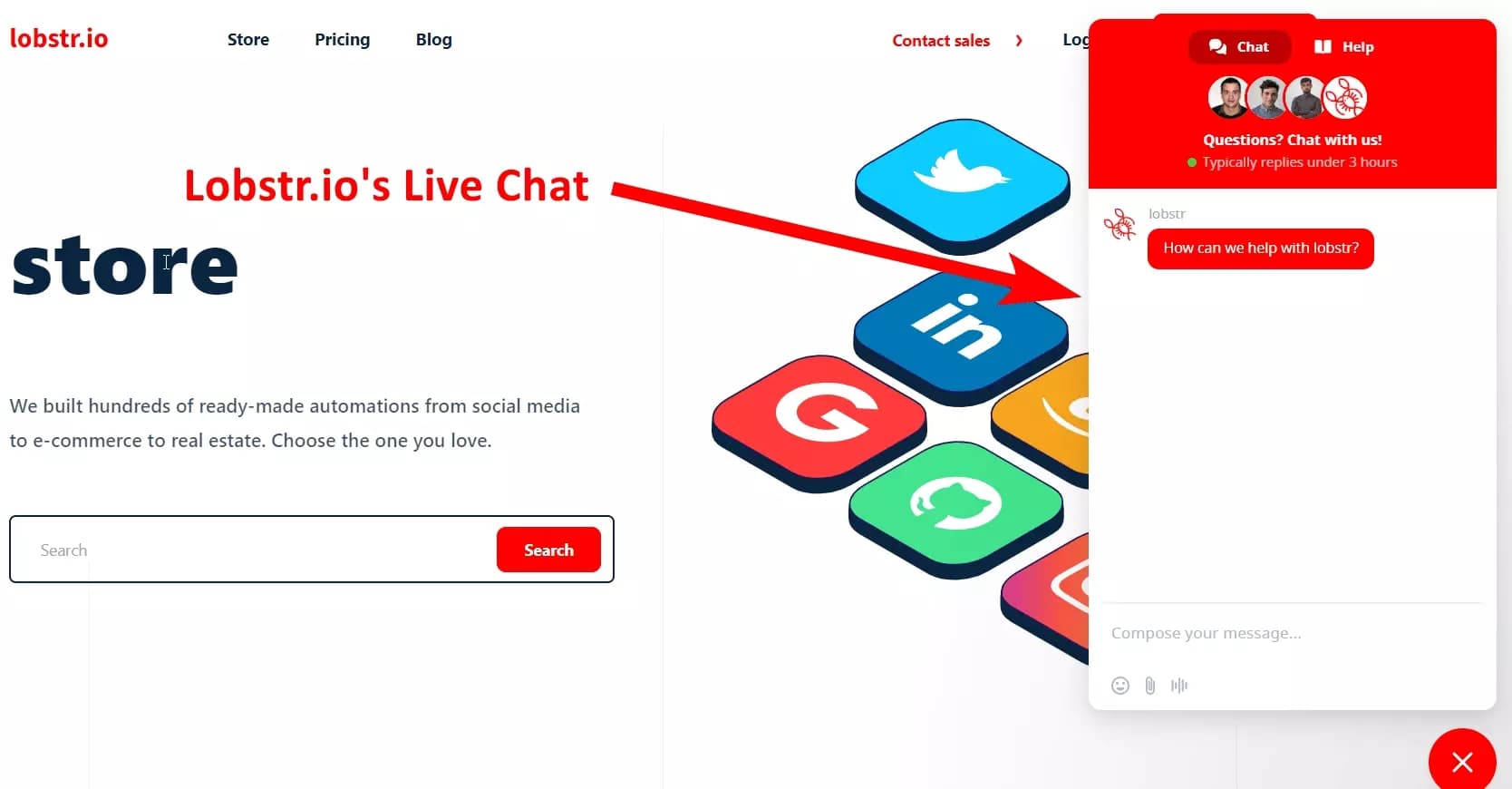
At Lobstr.io, we initially deployed the live chat feature to provide instant support to our users. But this turned out to be a lead magnet for us.
How to do it perfectly?
- Place live chat and chatbots on high-traffic pages
- Ensure the chatbot is programmed to escalate to a live agent when needed
- Customize chat messages based on user behavior
- Use chatbots to provide 24/7 support
- Use chatbots to gather contact details and key information about visitors
- Connect chatbot to a CRM to streamline lead management and follow-up processes
And that’s it. These were 12 proven and effective B2B SaaS lead generation strategies you should try in 2024.
Now let’s answer some frequently asked questions.
FAQs
What should my average deal size be to cold email our ideal prospects?
The ideal deal size for cold emailing depends on several factors:
- How long it takes to close a deal: Longer sales cycles often mean larger deals.
- How much money a customer is worth over time: High-value customers can justify smaller initial deals.
- How many deals your sales team can handle: Fewer, larger deals might be better if your sales team is small.
- How much competition there is: Standing out can be easier with larger deals in crowded markets.
- How complex your product or service is: High-value offerings often have larger deal sizes.
How can automation improve lead generation campaigns?
Automation helps you find more leads, faster.
It can supercharge your lead generation process by:
- Saving time
- Improving efficiency
- Personalizing outreach
- Optimizing campaigns
What Are the Best Lead Generation Tools for B2B SaaS lead gen?
There are plenty of tools available online for SaaS marketing automation. Here are my top 5 picks:
- Lobstr.io (lead data collection)
- Lemlist (cold mailing)
- Chatbot.com (AI chatbot)
- Ahrefs (for SEO)
- Hubspot (All in one inbound marketing solution)
How can testimonials and social proof enhance lead generation campaigns?
Testimonials and social proof enhance lead generation campaigns.
Here’s how:
- Boost trust, increasing the likelihood of converting leads
- Enhance credibility, making leads more responsive to marketing campaigns
